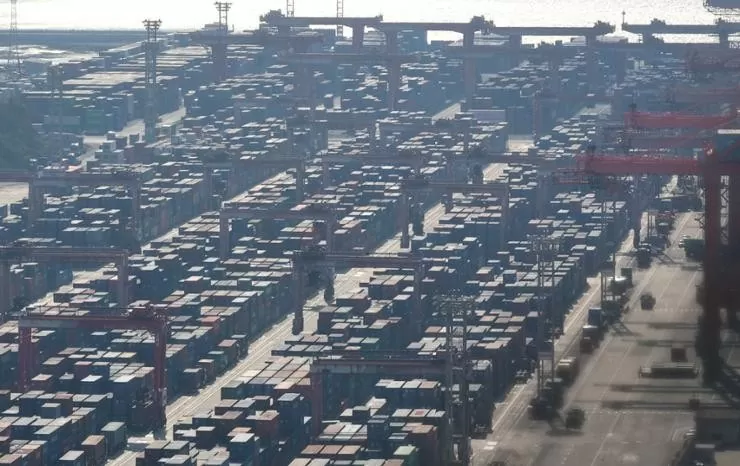
Half of Korean firms consider tightening belts in 2025
Latest
 |
| Containers laden with exports are loaded at a port in Busan, Friday. (Source: Yonhap) |
This trend was more pronounced among large enterprises, which are planning downsizing measures such as cost-cutting and workforce streamlining programs. The survey comes as the country’s exports in November grew by only 1.4 percent year-on-year, marking a 14-month low and amplifying concerns about looming economic uncertainties.
The Korea Enterprises Federation (KEF) surveyed from Nov. 7 to 20 the CEOs and other top executives of 239 domestic companies employing more than 30 workers and found that 49.7 percent of the respondents said their management policies for 2025 will focus on downsizing.
Another 28 percent said they plan to keep their current approach next year, while 22.3 percent indicated they will pursue expansionary strategies.
This represents the highest level of pessimism since 2018, when 50.3 percent of respondents indicated a preference for a conservative approach in 2019. The proportion of companies favoring a cautious management strategy has risen significantly in recent years, increasing from 22.9 percent in 2022 and 38.3 percent in 2024 to 49.7 percent next year.
The trend was more pronounced among medium-sized and large enterprises. Among companies with over 300 employees, 61 percent said they will tighten their belts in 2025, while 45.7 percent of smaller companies with fewer than 300 employees expressed the same intention.
When asked about investment plans, 39.5 percent of respondents said they plan to cut investments, while 35 percent indicated they will maintain current levels. Of those planning reductions, 58.5 percent were companies with over 300 employees.
A similar pattern was observed in their employment policies. Among the respondents, 44.6 percent said they intend to maintain this year’s hiring levels, while 36.9 percent signaled plans to reduce recruitment in 2025. Notably, 53.7 percent of those planning to downsize recruitment numbers were companies with more than 300 employees.
"Large enterprises showed a greater tendency toward conservative management, reduced investments, and fewer hires compared to smaller firms. This reflects that large companies are taking the current economic environment more seriously," a KEF official said.
Adding to their concerns, 52.7 percent of surveyed companies said their current flagship business will no longer be able to serve as their main revenue source within the next five years.
Among those who responded so, 58.8 percent stated that they have not yet determined or considered alternative business options, highlighting uncertainties.
When asked about their views on the incoming Donald Trump administration, 82 percent of respondents said its policies, such as protectionism, will have a negative impact on the Korean economy, which is heavily reliant on exports.
The Ministry of Trade, Industry and Energy said that Korea’s exports increased 1.4 percent year-on-year to $56.3 billion last month. Although this marked the 14th consecutive month of growth, the 1.4 percent increase was the lowest during that period.
“The shift toward belt-tightening strategies has become more palpable among companies, especially large ones, due to sluggish domestic demand, high labor costs and rising protectionist trends that add to external uncertainties,” the official said. “Given that the economic outlook for next year is not expected to improve substantially, it is urgent to create incentives for companies to expand their investments.”

























